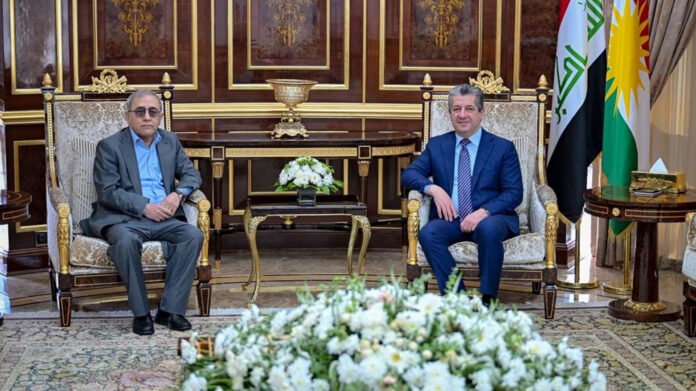The Kurdistan Region continues its effort to strengthen national identity through a bold push for cultural preservation. Prime Minister Masrour Barzani held a meeting with Kurdish Academy President HamaSaeed Hassan to discuss ways to support Kurdish language and literature. This meeting marked another step toward reinforcing the role of cultural institutions in Kurdistan.
The Prime Minister reaffirmed full support for the Kurdish language and literature. He also underlined the value of academic and literary efforts across the Region. During the discussion, both leaders explored strategies to expand research, publications, and language development.
The Kurdish Academy, under Hassan’s leadership, plays a key role in advancing language initiatives. The Academy produces books, runs language programs, and trains teachers. These efforts aim to preserve and develop Kurdish in all its dialects.
Prime Minister Barzani called on all government institutions to support Kurdish language and literature. He stated that cultural progress builds national identity and fosters unity. He also highlighted that every step in this direction brings Kurdistan closer to its goals of education, modernization, and identity preservation.
In addition, the Prime Minister emphasized the importance of intellectual freedom. He praised writers and critics for their role in shaping public discourse. He urged cultural institutions to work closely with schools and universities to ensure a strong link between education and heritage.
The Kurdish language and literature hold deep historical roots in the Region. Leaders believe that cultural heritage forms the backbone of any resilient society. Therefore, the Kurdish Academy receives strong backing from the Kurdistan Regional Government as part of its broader national vision.
Furthermore, both Barzani and Hassan stressed the need to publish more Kurdish-language works. They agreed to increase support for young authors and expand literary programs in rural areas. The government will also fund digital projects to make Kurdish books more accessible online.
The meeting concluded with a mutual promise to continue building a modern cultural identity. Both parties agreed to collaborate on future academic events, festivals, and regional conferences. The Kurdish Academy will also offer new language development courses to public employees and teachers.
This commitment to Kurdish language and literature reflects a wider strategy to protect the culture and history of Kurdistan. The government views this mission as essential for long-term progress and social unity.

